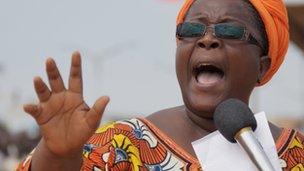
Isabelle Améganvi
The women of Togo have had enough. Like the women of Sudan two months ago, the women of Togo have had more than enough. More than enough of the same family ruling Togo for decades. More than enough of a political climate that doesn’t change. More than enough of men finding alibis for why things don’t change. Not just men. Their men. Their partners. And so, the women of Togo have called for a one-week sex strike.
In so doing, Isabelle Améganvi, head of the women’s wing of the Collectif Sauvons le Togo, or Let’s Save Togo Collective, invoked the experiences of Liberian women in stopping the war and the violence, first, and, more profoundly perhaps, calling everyone to act on their collective and individual responsibility. State violence doesn’t happen in a vacuum. Decades long State violence doesn’t happen without the cooperation and collaboration of the citizenry. Togolese women know, and are teaching, that lesson, as did their sisters in Liberia … and Kenya three years ago … and Italy four years ago … and Colombia seven years ago … and before that in Poland and in Iceland and the list goes on and on.
The call for a one-week women’s sex strike was issued at a mass demonstration over the weekend. The women were supported by traditional leaders. They marched to free political prisoners, held in deplorable conditions. They marched with thousands of others to end the regime; they marched to save Togo. And so they called a strike. By so doing, instead of declaring war, the women threatened to wage peace. As women across the centuries and around the world have done repeatedly, turning their bodies into … their bodies.
The political climate in Togo is built on oppression of women and sexual violence. Discrimination against women is common, domestic violence as well. Women make up 11% of the Parliament and 14% of the Ministerial positions. Women have little to no access to land ownership rights. Women have `born the brunt’ of political violence, especially in the 2005 elections during which targeted sexual violence against women was rampant. That violence has yet to be properly investigated.
So, the women of Togo, disobedient, insurrectionary, have had enough. They call for climate change. They call for Spring.
(Photo Credit: BBC)
